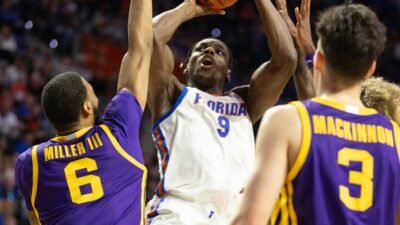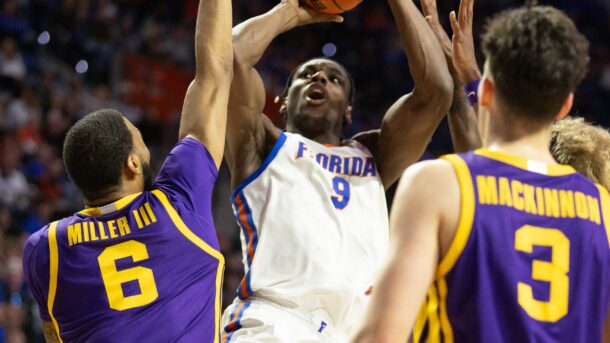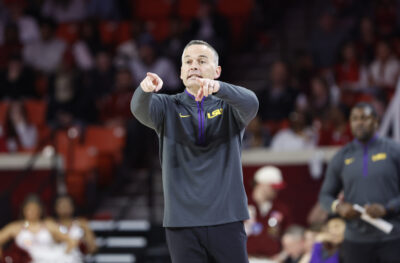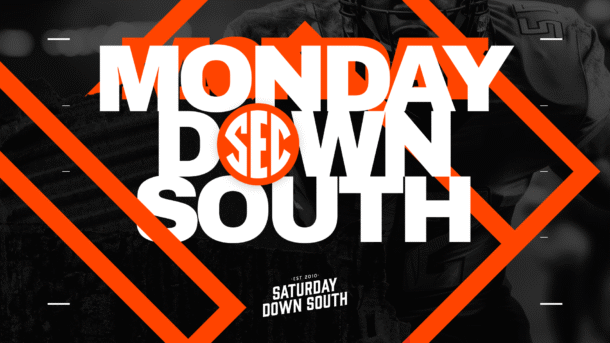
Monday Down South: The ‘Lane Kiffin conundrum’ tells us more about his ego than state of game
By Matt Hinton
Published:
Takeaways, trends and technicalities from Week 13 in the SEC.
Portrait of Lane in limbo
By all rights Saturday should have been one of the chillest days in the history of Ole Miss football: No pressure, no stakes, only an open date to bask in the once-in-a-generation opportunity in front of the Rebels before wrapping up the regular season this Friday in the Egg Bowl. Instead, they spent their week off being reminded at every opportunity of all the reasons their head coach has for leaving them high and dry.
In light of the long, lurid and ludicrous history of the coaching carousel, what is it about the Lane Kiffin saga that threatens to drive college football’s hive mind to new heights of madness? The money? The alleged “ultimatum”? Unshakable faith in his singular genius or charisma? Come on. Not that long ago Kiffin was a punchline, the poster boy for a new generation of entitled underachievers promoted too far, too fast. Now speculation over his future reached a fever pitch over a weekend on which his team didn’t even play, and is on the verge of becoming a full-blown spectacle.
What is it about this guy, in particular? A heck of a lot of ascendant coaches have found themselves the object of intrigue while their team’s season still hangs in the balance. None of them that I’m aware of has ever felt compelled to schedule an announcement a week in advance to alert the public of whether they intended to remain in their current job. And if if they had, not many of them could have commanded the kind of all-hands-on-deck treatment that’s in store over the coming days as Lane Watch ’25 approaches its climax.
It’s not like he’s the flavor of the month. At least this, Kiffin has come by his top-of-the-cycle hype more or less honestly, by winning big at a place that, historically, ain’t won much. That does not (yet) include a championship, of any stripe. After 6 years in Oxford, though, he boasts the 2nd-highest win percentage in Ole Miss history, behind only the guy whose name is on the stadium, Johnny Vaught, who retired the year before the team integrated. Exclude Kiffin’s debut, a 5-5 campaign amid the weekly chaos of the pandemic year in 2020, and he’d rank No. 1. With 1 more win over a nondescript version of of Mississippi State, the Rebels will secure only the 2nd 11-win season in school history (Kiffin also presided over the first, in 2023) and their first ticket to the College Football Playoff.
But then, there has never been a relatively young-ish head coach with a track record like that who hasn’t spent a few Thanksgivings fielding questions about has future. There has never been a head coach in his prime whose team is still in the thick of the national championship race at this point on the calendar who didn’t have some booster at some other school willing to cut a blank check with his name on it. All these blessings and curses and more come with the territory, when you’re the guy who made the place nobody ever thought that much about before something it has never been.
But there was nothing routine about the Kiffin discourse, which despite offering no significant developments, much less a resolution, sucked up more oxygen nationally over the weekend than virtually any single game actually unfolding on the field. Why? Because of some secret sauce he brings to the table as a play-caller or recruiter? I don’t think so. I think it’s because there has rarely been another coach in his position – possibly never, if you narrow it down to coaches tempted by the prospect of abandoning ship literally in the midst of a potential championship run – who is so openly willing to say yes.
Now hang on, I can hear Kiffin apologists object. Take a good look around. Look at the sport. Look at the country. Look at what’s on the table. Did Kiffin ask for any of this? Or is it a sign of the times, one that says less about him, or anyone in particular, than it does about the madcap state of college football?
The calendar, obviously, is in shambles. The overlapping demands of the carousel, recruiting and the transfer portal have only increased the urgency of hitting eject on a struggling coach sooner than ever and getting the next guy in the fold ASAP. There has never been less incentive to practice patience with a coach on the hot seat or to lock up his replacement. (Not for nothing, Virginia Tech just became the first big-time school in recent memory to fill a permanent head-coaching vacancy before the team had even finished the regular season with someone other than the interim coach; a little less than a month after he was abruptly shown the door at Penn State, James Franklin was on hand in Blacksburg on Saturday to introduce himself during the Hokies’ loss to Miami, a ritual that had previously been reserved for bowl games.) The money, objectively, is obscene. It’s also absurd, almost entirely unbound by any rational market forces, and driven instead by the need for schools going big-game hunting to spend in a fashion that justifies their ambition – regardless whether the coaching talent on the receiving end of their largesse justifies it. If you’re not willing to break financial records to fill the trophy case, are you even trying?
Kiffin’s old boss, Nick Saban, is one of many insisting don’t hate the player, hate the game. “This is not a Lane Kiffin conundrum,” Saban said Saturday from his pregame perch on College GameDay. “This is a college football conundrum that we need some leadership to step up and change the rules on how this gets done in terms of coaching searches and opportunity for people to leave.”
Well, that would be great. Leadership! I wonder who Nick might have in mind? Certainly not anyone currently in a leadership position. For the foreseeable future, NFL-style collusion to regulate the carousel is a pipe dream, both because there is no one willing or able to enforce it and because anyone who tried would be signing up to appear in court until kingdom come.
Meanwhile, the numbers keep going up and the timelines keep getting tighter. LSU’s overture to Kiffin is reportedly in the neighborhood of $90 million to $98 million over 7 years, which would represent the most brazenly inflated yet of the mega deals that keep resetting the bar in the wake of the infamous 10-year, $75 million albatross of contract Texas A&M gave to Jimbo Fisher 8 years ago. Do the math folks, that is more $13 million per year to coach college football, a club whose current membership includes Kirby Smart and no one else. That makes the $9 million per year Kiffin currently makes in Oxford – the result of his last flirtation with leaving, for the Auburn vacancy that eventually went to Hugh Freeze in 2022 – seem positively quaint.
Just as importantly, LSU will also reportedly kick in another $25 million annually to spend on the roster. If that number turned out to be real, it would easily exceed the salary cap that went into effect this year, which is limited to funds designated under a landmark revenue-sharing agreement and does not apply to third-party NIL funds. (Given the looming pushback over the new regime’s efforts to crack down on free-range NIL spending, that’s a very big if.) Maybe even more so than for the salary, Ole Miss would have to reach very deep to meaningfully compete with that number, year-in, year-out.
Here’s the thing, though: While LSU can point to the enormous, sustained investment it’s willing and able to make in assembling a championship-caliber roster in the future, in Oxford, the enormous investment Ole Miss has made in assembling a championship-roster is currently paying off right now, as we speak, in an actually existing team — not a hypothetical one a few years from now — that’s poised to host a first-round Playoff game, at worst. From there, the Rebels have about as viable a chance of advancing into the later rounds as any team other than Ohio State.
Everybody understands more money. But it takes a terminal case of galaxy brain run amok to determine that the only way of fulfilling your ultimate goal of winning a championship is to leave a team actively that’s contending for one.
Ironically, the most relevant example of a coach who made a similar choice to the one Kiffin is facing is the guy he’d be replacing in Baton Rouge: Brian Kelly. Up until a couple of years ago, an ambitious, championship-or-bust coach could have credibly cited LSU’s resources and championship track record as a meaningful distinction compared even to other high-profile jobs — Kelly, of course, memorably did exactly that when he bailed on Notre Dame in November 2021 more or less explicitly to chase a ring in the SEC, despite the Fighting Irish remaining very much alive for a potential 4-team CFP bid on the day Kelly decided there was no such thing as a championship window in South Bend. He is the only head coach in the Playoff era to leave a team with a non-zero chance of making the field, and he might never stop regretting it.
Four years later, it’s a different world, and the longstanding assumptions about what it takes to build and sustain a contender in the NIL/portal era are changing fast. In fact, besides his own merits, one reason Kiffin has been so hotly pursued is that nearly all of his would-be peers at the top of a typical coaching cycle responded to the glut of midseason vacancies by negotiating extensions where they already are. Curt Cignetti, potentially the biggest fish in the free-agent pond if he’d had any mind to be, re-upped at Indiana, securing a major financial commitment in the process. Ditto the other consensus home-run hire of the past couple cycles, Texas A&M’s Mike Elko, earlier this month. Ditto Rhett Lashlee at SMU. Ditto Matt Rhule at Nebraska. For all of them, the big opportunity is the one right in front of them, and they bet on extending that window as far into the future as possible.
That leaves Kiffin, whose impish approach to being America’s Most Wanted Coach has not gone over nearly well as it does on the sideline. If he never asked to be the center of attention, he hasn’t exactly done anything to dissuade it, either. Especially the one thing that actually would: Assuring the locals that he’s not going anywhere. At any point, he could have said “I’m excited about the opportunity of my damn strong football team, have a great day,” and ended the ordeal as the most popular man in a state that has embraced him.
He could have done that at any time over the past few weeks as it became obvious his name was rising to the top of the list of targets for a sudden glut of vacancies. Instead, he spent his off week tweeting through the drama, keeping up his regimen of hot yoga and motivational quotes, and giving interviews that pointedly avoid saying anything about his future. Every day that passes without resolution now feels like another step closer to the door, and closer to the sobering possibility that, for all the Rebels invested in making the Kiffin project one of the defining successes in school history, he only ever saw them as the shortest route to get where he was really going all along.
CFP Realpolitik
It’s that time of year, when the fog begins to lift and the outlines of the postseason picture begin to come into view. Each week down the home stretch, CFP Realpolitik will size up the pecking order from a strictly practical perspective.
Week 13 was as about as chalky as they come: Teams ranked in the top 20 in last week’s CFP committee rankings were a combined 14-2, with no real disruption to the status quo. The “Green Zone,” the 10 teams we can safely project into the field barring a major upset, remains intact.
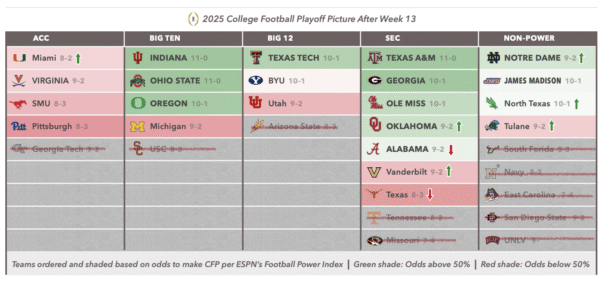
Bama on the bubble. The committee threw a lot of projections for a loop last week by ranking Notre Dame 1 spot ahead of Alabama. We will not be debating the merits of that decision here, only its consequences. Specifically the fact that, as it stands, Bama is now the last team in the at-large queue.
The good news is that the Crimson Tide control their fate. Wins in the Iron Bowl and SEC Championship Game will punch their ticket as SEC champs, no questions asked. The questions come if the Tide make it to Atlanta (where they could still face Texas A&M or Georgia) and suffer a 3rd loss.
In most scenarios, the Tide should still be fine. The committee signaled last year that it is not inclined to drop teams that lose their conference championship games in favor of teams that are sitting at home. Neither team directly behind Bama in the CFP rankings, BYU and Utah, figure to be in any position to skip the line for an at-large bid.
The nightmare scenario for Alabama (and all bubble teams) is what happens if BYU or Utah springs an upset over Texas Tech in the Big 12 Championship Game. The Red Raiders are runaway favorites to win the conference and the automatic bid that goes with it; as long as that bid goes to Tech, it will very like be the only 1 the league gets. If BYU or Utah manages to steal that bid, though, the Raiders will be bumped into the at-large circle, thereby bumping somebody out. Right now, that somebody would be Alabama. If they can’t win out themselves, the Tide need to be rooting specifically for the Raiders.
‘Dores closed. A Vanderbilt win over Tennessee in Knoxville would clinch the first 10-win season in school history. Projecting a Playoff path is dicier. Besides taking care of their own business, the Commodores also need to jump at least 4 spots, from No. 14 to No. 10, to have a shot. In other words, at least 4 of the 6 teams ranked directly above them — Oklahoma, Notre Dame, Alabama, BYU, Utah and Miami — need to lose on the final weekend of the regular season to open up a potential path. The ‘Dores are playing their best football, well, possibly ever. But if they get that much help on one Saturday, they are truly charmed.
Chaos agent: Michigan. The Wolverines opened as 11.5-point underdogs against Ohio State in Ann Arbor; that number was quickly bet down to -9.5, a nod of respect to both Michigan’s 4-game winning streak in the series and 7-1 start in Big Ten play. Frankly, the former is more compelling than the latter: Michigan hasn’t faced a ranked opponent since its Week 2 loss at Oklahoma, benefiting enormously from the luck of the draw in the conference slate. In an 18-game conference, you only wind up playing half the teams in it, and the half the Wolverines didn’t play (including Indiana, Oregon, Illinois and Iowa) is significantly better than the one it did.
But the record leaves the Wolverines in position to make a late, dramatic move against OSU, and potentially crash the Big Ten Championship Game with an automatic bid on the line. Even as an at-large, a 10-2 Michigan outfit with what would be arguably the single best win of the season under its belt would be almost impossible to snub. Unfortunately, you could say the same thing about all the teams they might plausibly replace. If you’re looking for a maximum conflagration guaranteed to leave multiple parties enraged, you’re rooting for the Maize and Blue this weekend.
Dude of the Week: Diego Pavia
A couple weeks back I made the case for Pavia as a Heisman finalist following what was then his best game of the season in a come-from-behind overtime win over Auburn. He arguably eclipsed that outing Saturday, finishing 33-for-39 for a career-high 484 yards and 5 touchdowns in his final Vanderbilt home game, a 45-17 romp over Kentucky that played out as a start-to-finish party in Nashville.
Everybody knows who Pavia is; I’m not sure how many people are actually watching his best games, which is a big deal in Heisman politics. His gonzo outings against Auburn and Kentucky both unfolded on the relative obscurity of the SEC Network. But few if any players nationally are more valuable to their team — Vandy Before Pavia vs. Vandy After Pavia is a completely different program — and few quarterbacks have been more productive. For the season, Pavia ranks 5th nationally in Total QBR; 4th in EPA; 4th in yards per attempt; 3rd in total offense; 3rd in pass efficiency; 2nd in passing success rate; and tied for 2nd in overall PFF grading. He still has to show up against Tennessee, but barring a meltdown in Knoxville, I’m ready to book his ticket to New York myself. (Offer void were prohibited.)
Dud of the Week: The Schedule
In a season defined largely by parity and close calls, only 1 of the 10 games featuring SEC teams on Saturday was decided by single digits: a 13-10 slog between LSU and Western Kentucky which featured a combined 14 punts and 5 failed 4th-down conversions. The weekend’s other 5 nonconference games were decided by a combined score of 252 to 27, including Alabama’s 56-0 romp over Eastern Illinois in which the Crimson Tide held EIU to a grand total of 2 first downs and 34 yards for the game. And even that was still not as depressing as Tennessee’s wipeout win over Florida, which trailed 28-0 in The Swamp before its offense crossed midfield for the first time.
The 9-game conference schedule cannot get here fast enough.
Moment of Zen of the Week
Matt Hinton, author of 'Monday Down South' and our resident QB guru, has previously written for Dr. Saturday, CBS and Grantland.


